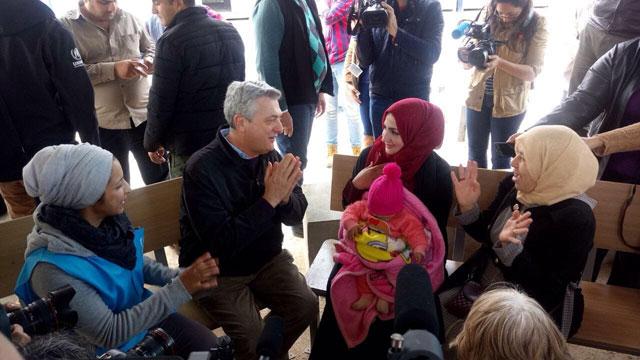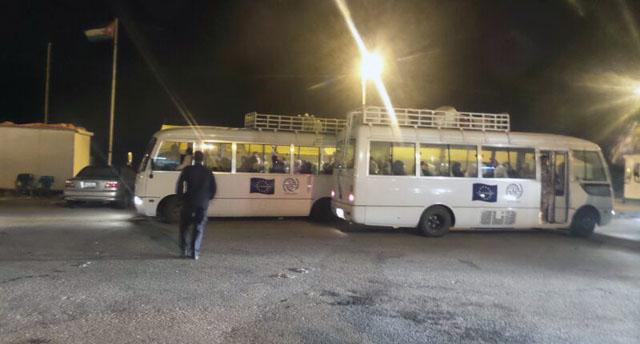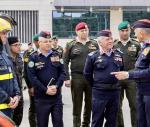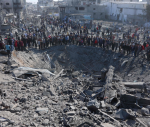You are here
Jordan to speed up screening for Syrian refugees in Azraq — Grandi
By Khetam Malkawi - Oct 24,2016 - Last updated at Oct 25,2016
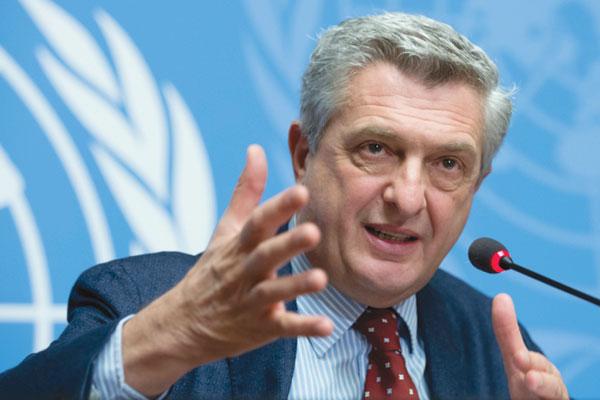
Filippo Grandi
AMMAN — Jordan will accelerate the security screening process for 20,000 Syrian refugees in Azraq camp who entered from the no-man's-land near the border earlier this year, a UN official said on Monday.
Before the closure of the northeastern border after a deadly terror attack in June, Jordan allowed around 300 Syrians to enter daily on the condition that the newcomers would be isolated in Azraq for security checks.
A fenced camp was set up in Azraq in late March to speed up the admission of Syrians from the border area. The strict measures aimed to prevent Daesh extremists from infiltrating the Kingdom.
At a press conference in Amman following a three-day visit to the Kingdom, UNHCR High Commissioner Filippo Grandi said the screening process for the refugees in Azraq would be accelerated to allow them to leave the fenced camp into other blocks of Azraq Camp.
Meanwhile, UN agencies are discussing various options with the Jordanian government to allow aid to the 80,000 Syrians still stranded in the no-man's-land along the border, known as the berm, Grandi told reporters.
The mechanism of delivering aid is complicated, Grandi said, adding that one proposal entailed moving the displaced Syrians to a different site.
“The key request of the government is that the population does not stay in that particular location. From a security point of view, it is not viable, so whatever assistance we will be able to provide, will be provided a bit further away,” the UN official explained.
The envisioned mechanism of aid delivery, Grandi said, should provide answers to questions like who will deliver the aid; how to make sure that the people who are really in need get that assistance and not people who have other intentions; how to communicate with these people and how to operate in an environment which is highly insecure.
“I am confident that with the cooperation of the government and some supporting states of the UN, we will come soon to an arrangement, whereby assistance will be able to flow or be delivered to those in need of that assistance, but it will be a complex exercise.”
Speaking about the situation of Syrian refugees in the Kingdom, the UN official said the Jordan Compact had resulted in a positive change in refugees’ lives. He said that 32,000 Syrians in Jordan have received work permits in recent months and Syrian children have further access to schools, while resettlement from Jordan to third countries is expected to rise to 30,000 in 2016, from 24,000 last year.
Through investments, jobs will be created for both Jordanians and Syrians, he added.
However, as the war is not over yet, Syria’s neighbours will continue to host the refugees they already have, but with fewer resources, and further displacements could take place in Syria.
“We, as UN agencies, will continue to appeal for additional resources,” Grandi said, adding that around 53 per cent of the resources needed to deal with the Syrian refugee crisis had been received. As for donors’ pledges at the London conference in February, $4.5 billion of the $6 billion pledged has been disbursed, according to Grandi.
Related Articles
AMMAN — Czech Ambassador to Jordan Petr Hladik said his country will commit around $2 million to support the refugee settlements near the no
ZAATARI REFUGEE CAMP — The United Nations High Commissioner for Refugees (UNHCR) Filippo Grandi on Sunday said that there has not been any d
The Korean embassy has presented eight vehicles to the International Organisation for Migration (IOM) in Jordan to facilitate the provision of aid for Syrian refugees and host communities.


